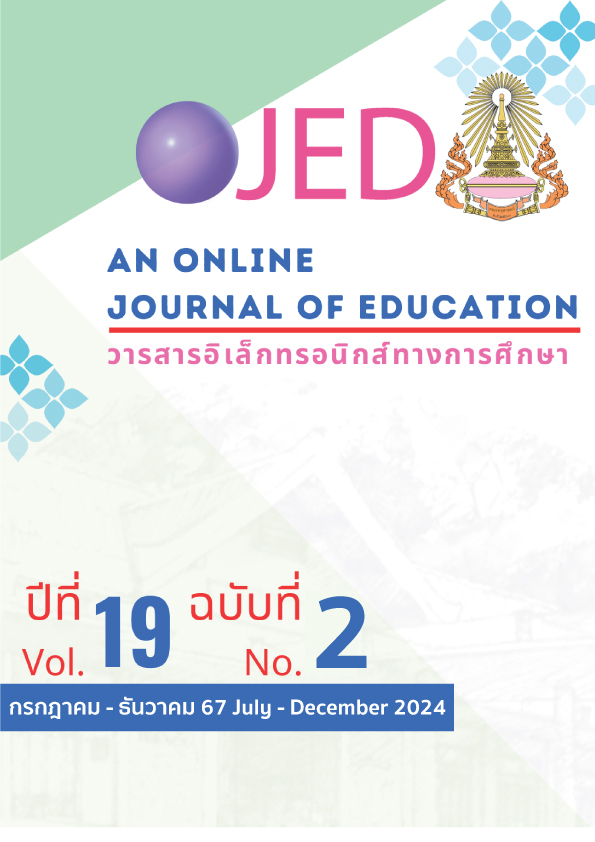แนวทางการส่งเสริมความฉลาดรู้ทางการเมืองของนักเรียนมัธยมศึกษาตอนปลาย
DOI:
https://doi.org/10.14456/ojed.2024.8คำสำคัญ:
ความฉลาดรู้ทางการเมือง, แนวทางการส่งเสริม, นักเรียนมัธยมศึกษาตอนปลายบทคัดย่อ
งานวิจัยครั้งนี้มีวัตถุประสงค์เพื่อ 1) ศึกษาองค์ประกอบและพฤติกรรมบ่งชี้ของความฉลาดรู้ทางการเมืองของนักเรียนมัธยมศึกษาตอนปลาย 2) เสนอแนวทางการส่งเสริมความฉลาดรู้ทางการเมืองของนักเรียนระดับมัธยมศึกษาตอนปลาย โดยใช้วิธีการวิจัยเชิงคุณภาพ ได้แก่ สังเคราะห์เอกสาร สัมภาษณ์ สนทนากลุ่ม และวิเคราะห์ข้อมูลเชิงเนื้อหา กลุ่มเป้าหมายในการวิจัย คือ ผู้เชี่ยวชาญ 3 กลุ่ม ได้แก่ ผู้เชี่ยวชาญด้านรัฐศาสตร์ ผู้เชี่ยวชาญด้านหลักสูตรและการสอน และครูผู้สอนวิชาสังคมศึกษา รวม 65 ท่าน เครื่องมือที่ใช้ในการวิจัย คือ แบบสัมภาษณ์ แบบยืนยันองค์ประกอบ บันทึก การสนทนากลุ่ม และแบบประเมินประสิทธิภาพ ใช้การวิเคราะห์ข้อมูลเชิงเนื้อหา ผลวิจัยพบว่า 1) องค์ประกอบของ ความฉลาดรู้ทางการเมืองมี 5 องค์ประกอบหลัก ได้แก่ ความรู้เกี่ยวกับการเมือง การรู้เท่าทันข้อมูลข่าวสารทางการเมือง การเข้าอกเข้าใจมุมมองทางการเมืองของตนเอง การอยู่ร่วมกับผู้อื่นที่เห็นต่างทางการเมือง และการแสดงออกและมีส่วนร่วมทางการเมือง 2) แนวทางการพัฒนาความฉลาดรู้ทางการเมือง ประกอบด้วย (1) เป้าหมายการพัฒนาเน้นการพัฒนาองค์รวม (2) หลักการ SECMAR (3) แนวทางการพัฒนา 6D Model (4) กลยุทธ์และวิธีการจัดการเรียนรู้แบบบูรณาการ การเรียนรู้จากประสบการณ์ และการฝึกทักษะการคิดตัดสินใจ (5) ระดับการพัฒนาความฉลาดรู้ทางการเมืองมี 3 ระดับ (6) รูปแบบการนำแนวทางไปใช้ในสถานศึกษา 2 รูปแบบ (7) แนวทางการวัดและประเมินผลเน้นแบบองค์รวม การปฏิบัติจริง และการตัดสินใจผ่านสถานการณ์
เอกสารอ้างอิง
ภาษาไทย
กิตติชัย ขันทอง. (2565). การปรับปรุงหลักสูตรการศึกษาที่ส่งเสริมความรู้ทางการเมืองในโรงเรียนไทย. วารสารการศึกษาและนวัตกรรม, 14(1), 77-90.
ณัฐฐินันท์ นันทะเสนา. (2563) แนวทางการเคลื่อนไหวทางสังคมโดยกลุ่มนักศึกษาขบวนการประชาธิปไตยใหม่. วารสารพัฒนาสังคม. 23(2), 52-71.
ธนธัช ชัยพรหม. (2558). การสอนวิธีคิดเชิงวิเคราะห์ในสถานการณ์จำลองทางการเมือง. วารสารการพัฒนาการศึกษา, 18(1), 91-104.
ธนพร นพรัตน์. (2565). การสะท้อนมุมมองทางการเมืองของนักศึกษาในประเทศไทย: การส่งเสริมความตระหนักรู้ในมุมมองทางการเมืองของนักเรียน. วารสารการศึกษาและการพัฒนา, 9(1), 45-67.
https://doi.org/10.1234/education.2022.00123
นริศรา จิตต์จรัส. (2566). การวิเคราะห์และประเมินข้อมูลข่าวสารทางการเมือง: ผลกระทบต่อการรู้เท่าทันข่าวสารทางการเมืองของนักเรียนระดับมัธยมศึกษา. วารสารวิจัยการศึกษา, 24(1), 75-90.
ประจักษ์ ก้องกีรติ. (2565, 4 กุมภาพันธ์). สู่โลกใบใหม่ ด้วยพลังแห่งวัยเยาว์. Amnesty International Thailand. https://www.amnesty.or.th/latest/blog/9861/
รัฐธรรมนูญแห่งราชอาณาจักรไทย พุทธศักราช 2560. (2560, 6 เมษายน). ราชกิจจานุเบกษา. เล่มที่ 134 ตอนที่ 40. หน้า 1-90.
รัตนะ บัวสนธ์. (2551). เทคนิคการวิเคราะห์ข้อมูลเชิงเนื้อหา. วารสารวิจัยการศึกษา, 4(1), 15-35.
วัลลภ รัฐฉัตรานนท์ และ รัตนาวดี ลำพาย. (2563). การมีส่วนร่วมทางการเมืองของเยาวชนไทย: มูลเหตุ รูปแบบ และผลที่เกิดขึ้นตามมา. วารสารรัฐศาสตร์ปริทรรศน์, 7(1), 1-18.
สำนักงานเลขาธิการสภาการศึกษา. (2563). การจัดการเรียนรู้ฐานสมรรถนะเชิงรุก. http://backoffice.onec.go.th/uploads/Book/1801-file.pdf
สำนักงานราชบัณฑิตยสภา. (2562). พจนานุกรมศัพท์ศึกษาศาสตร์ร่วมสมัย ชุดความฉลาดรู้ (Literacy) ฉบับราชบัณฑิตยสภา. สำนักพิมพ์อรุณการพิมพ์.
ภาษาอังกฤษ
Banks, J. A. (2009). Teaching strategies for ethnic studies (6th ed.). Allyn & Bacon.
Denzin, N. K., & Lincoln, Y. S. (2018). The SAGE handbook of qualitative research. Sage.
Finkel, S. E., & Ernst, H. R. (2005). Civic education in post-apartheid South Africa: Alternative paths to the development of political knowledge and democratic values. Political Psychology, 26(3), 333-354.
Fisher, A. (2010). Critical thinking: An introduction. Cambridge University Press.
Gordon, S. (2020). In-depth interview methods in social research: A guide for researchers. Qualitative Research Journal, 20(3), 215-228.
Hennink, M. M. (2007). International Focus Group Research: A Handbook for the Health and Social Sciences.Cambridge University Press.
Hess, D. J. (2009). Teaching students to be politically literate: The role of classroom discussion. Social Education, 73(3), 146-151.
Hoskins, B., & Crick, R. D. (2010). The development of political literacy: Levels of complexity and associated skills in civic education. Citizenship Studies, 14(3), 329-343.
Johnson, D. W. (1994). Cooperative learning: Methods and strategies for social science education. In M. L. de Vries (Ed.), Handbook of social studies education (pp. 203-214). Westport, CT: Greenwood Press.
Kahne, J., & Bowyer, B. (2017). Educating for civic engagement: The role of digital media in promoting critical media literacy. Theory and Research in Social Education, 45(2),
-235. https://doi.org/10.1080/00933104.2017.1281630
Kahne, J., & Middaugh, E. (2021). Participatory learning for citizenship development: Engaging students in meaningful civic education. Journal of Civic Education, 23(1), 45-62.
Kolb, D. A. (1984). Experiential Learning: Experience as the Source of Learning and Development. Prentice-Hall.
Kurth-Schai, R. (2006). Principles for holistic citizenship assessment: Moving beyond knowledge and skills to include behaviors and attitudes aligned with civic engagement. Journal of Civic Education, 14(2), 153-167.
Manning, K., & Edwards, R. (2014). Engaging students in political activities: Enhancing real-world political participation and civic skills development. Journal of Political Science Education, 10(1), 15-34.
https://doi.org/10.1080/15512169.2014.869697
Merrill, M. D. (2021). First Principles of Instruction: Designing Effective Instruction. Wiley.
Miller, D., & Dijk, T. (2021). The role of developing tolerance in listening to differing opinions
in fostering understanding and resolving political conflicts. Journal of Political Psychology, 42(3), 405-420. https://doi.org/10.1111/pops.12689
Paul, R., & Elder, L. (2002). Critical thinking: Tools for taking charge of your professional and personal life. Financial Times Prentice Hall.
Putnam, R. D. (2021). The importance of political participation and expression in strengthening local and national politics and society. American Political Science Review, 115(1), 1-15.
https://doi.org/10.1017/S000305542000012X
Westheimer, J., & Kahne, J. (2004). What kind of citizen? The politics of educating for a democratic society. American Educational Research Journal, 41(2), 237-269
ดาวน์โหลด
เผยแพร่แล้ว
รูปแบบการอ้างอิง
ฉบับ
ประเภทบทความ
สัญญาอนุญาต
ลิขสิทธิ์ (c) 2024 วารสารอิเล็กทรอนิกส์ทางการศึกษา

อนุญาตภายใต้เงื่อนไข Creative Commons Attribution-NonCommercial-NoDerivatives 4.0 International License.




